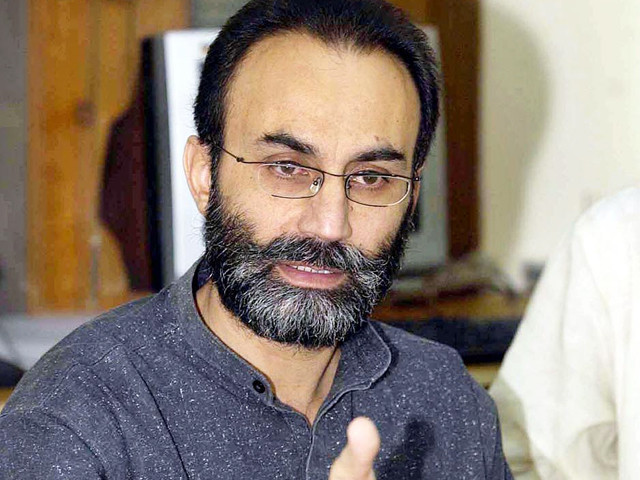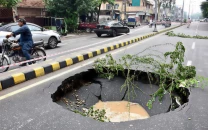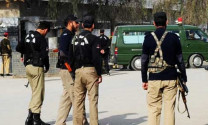Interview with Lashkari Raisani: Inside the mind of a ‘Baloch hardliner’
Former PPP leader disillusioned by the party’s handling of Balochistan issue.

In his first interview after his controversial resignation, Raisani shared with The Express Tribune his growing sense of disaffection with the PPP, which heads the federal government as well as provincial government in Balochistan.
The significance of this criticism is not lost on anyone – especially since Balochistan Chief Minister Nawab Aslam Raisani happens to be Lashkari’s brother. Fraternal considerations, however, did not get in the way of Lashkari’s increasingly vocal disapproval of the provincial and federal governments. Though rampant corruption was an important factor in his dramatic exit from the post of PPP Balochistan president, it wasn’t the only factor.
“I realised that they are not serious about resolving important issues, particularly this year’s crisis in Balochistan. The emergence of the PPP government in Islamabad in 2008 was the outcome of a deal ... between a few people and the United States,” says the younger Raisani.
“The Balochistan issue is not just a matter of jobs and funds ... I’d been telling them to improve the quality of governance but financial corruption remained (the federation’s) first priority.”
This is not the first time, however, that Raisani has spoken out so strongly against the PPP and the government, both federal and provincial. For many, his resignation over the PPP’s half-hearted attempts in Balochistan and his harsh assessment of the party came as no surprise. In September 2011, the senator lashed out against the then interior minister Rehman Malik, saying he had a moral obligation to resign after ‘sabotaging the peace process’ in Balochistan. In the same month, he declared that Balochistan insurgents wanted to participate in the political process.
Soon it became apparent that negotiations with insurgents seemed to be going nowhere – and Raisani showed signs of party disillusionment a couple of months prior to his resignation. He even turned down an award from the president in recognition of his services.
“We could have changed peoples’ lives after the demise of Shaheed Benazir Bhutto when we came into power. But it would have only been possible with good governance, proper management and planning. What happened was the other way round.”
‘The foreign hand’
The self-confessed ‘Baloch hardliner’ says that the presence of huge gold reserves in Reko Diq is causing bloodshed in the province. Referring to a tussle between global mining companies over exploration rights, Raisani states matter-of-factly: “At the moment, China is closing in towards these mines with the help of ‘boots’ [on the ground].
He’s also quick to point out that the government alone is not to blame. The ‘foreign hand’ is active in the killing of Baloch people and security personnel. And while stating that these security forces are involved in killings, so are the Taliban and al Qaeda, he says. But he adds a caveat: the interior ministry and intelligence agencies must be held responsible for their failure to check this foreign interference.
Raisani claims that Balochistan is a battleground for a relatively new war; the struggle between fundamentalism and capitalism. And the Baloch people, Raisani says, are caught in the middle of a proxy conflict, reminiscent of the Cold War. For him, the conflict extends beyond China and western powers and is partially a war between Arabs and ‘Iran’ – and Pakistan’s forces are party to it.
Balochistan’s future
When asked whether Balochistan was likely to be separated from Pakistan, Raisani says immediately, “If the same situation carries on ... no doubt.”
While many have turned to the Supreme Court’s initiative to improve the law and order situation, Raisani is sceptical. “What was the result of the Supreme Court’s initiative on law and order situation in Karachi?” he asks wryly.
But the ex-PPP stalwart isn’t all criticism. He has some solutions to offer. After explaining that Balochistan’s problems are not only socio-economic but also historical, geographical, administrative and constitutional, he states emphatically: “The government will have to find the solution to these issues as a first priority with principles of transparency but not with conspiracy.”
Raisani says that this can only happen without interference from intelligence agencies or the military’s meddling in politics. Zero tolerance for financial corruption is also necessary, as is an acceptable solution to the missing persons issue, he emphasises. Confidence building measures will also go a long way to restore trust in the state and an early repatriation of Afghan refugees, Raisani says.
However, he believes that “the people calling the shots either do not have the required capability or are not interested.” This was obvious to him after the All Parties Conference initiative didn’t work out. Now, he says, the federal government has missed its chance.
Raisani believes that the Baloch people are no longer in the mood for talks.
As for the controversial role of the Frontier Constabulary (FC) in Balochistan, he makes it clear that his brother, the chief minister, is not administratively in control of the FC as was portrayed by former prime minister Yousaf Raza Gilani. “Do you think that (army chief) Kayani is under President Asif Ali Zardari?” he questions.
Raisani’s future
So what are the options for Lashkari Raisani now? The former senator is unsure himself. “I have not decided which political party to join in the future,” he says. Asked if he planned to set up his own radical political party, he says, “I do not want to further divide my already divided people. I am a hardliner ...”
Commenting on reports that he was being persuaded by Jamiat Ulema-e-Islam (JUI-F) chief Maulana Fazlur Rehman to join his party, he says, “Yes, there are chances of success for such a proposal if we joined JUI-F along with my political associates.”
Regardless of his future political affiliations, Raisani vows not to compromise on his principled stand on the rights of Balochistan and its people.
Published in The Express Tribune, July 9th, 2012.



















COMMENTS
Comments are moderated and generally will be posted if they are on-topic and not abusive.
For more information, please see our Comments FAQ